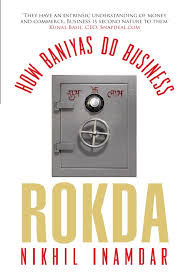Baniya-Buddhi is what we Baniyas call common sense. If you ask most businessmen the secret of their success they would attribute it to basic common sense. Common sense, that you get from observation and experience. For a long time, I have wanted to do some research on what makes Baniyas tick. So I was very happy when I saw this book, Rokda: How Baniyas do Business by Nikhil Inamdar, and it’s byline.
Rokda features five successful businessmen who are Baniyas. Two of them – the Emami Duo and R K Somany of Hindware fame come from traditional industry. And represent the first generation of businessmen that came up after India gained independence. Both of them have handed over their businesses to the next generation. Though, not dissociated completely from the business. Neeraj Gupta of Meru Cabs represents someone who comes from a business family – a typical Baniya family that hails somewhere from Rajasthan/Haryana/Punjab. But someone who has created a huge business in a space his family had no grounding in. The author presents Rohit Bansal of Snapdeal as a small town boy who is ruling a new age business. He also profiles V K Bansal of Kota’s famous Bansal Classes as someone who turned an adversity into a huge business.
Each story is a personal story of the entrepreneur, where the business is their baby. Also, there is an attempt to look at the challenges in the growing up years and where there were none. Nikhil Inamdar uses adjectives like small-town boy from Malout. Having born and lived very close to Malout, and visited that place quite a bit during my childhood, I know it does not come with as many disadvantages as the book portrays. Assuming all small towns are equally disadvantaged. I think in all stories it was the V K Bansal’s life story that had a real challenge and what he created was quite unique. Though again, I am not a fan of coaching classes – as they only teach you how to pass a particular exam in the garb of education – somewhere making fun of the education system.
What I had expected from the book was some insights into the psyche of these entrepreneurs. And what is it, in their genes or upbringing that makes them so successful in businesses. The author leaves that aspect, more or less, untouched. In a couple of stories, Nikhil mentions the word Baniya but not really explores it. In others, it is not even mentioned. I expected the author to share his insights from meeting these and a lot more Baniya entrepreneurs in his journalistic career that made him do an entire book on them. I wanted an exploration into those who did not want people to identify them by the ‘Baniya’ tag. And why would they do that? The least I wanted was, bringing out of some common business practices/ethics/systems/values that all these businessmen followed.
The language is simple and the stories flow in a neat narrative. They are easy to read like a bedtime story. As someone who loves to read business stories (I am a Baniya too), I think I enjoyed the journeys of brands like Emami and Hindware. We have been using them and watching them through their TV commercials. But we never get to hear their journeys. Meru Cabs was also a good story. Snapdeal was something I knew about so there were no surprises there, except the personal story of Bahl & Bansal.
Read it if you enjoy reading inspiring journeys of entrepreneurs.
You may buy this book – Rokda: How Baniyas do Business by Nikhil Inamdar at Amazon.









